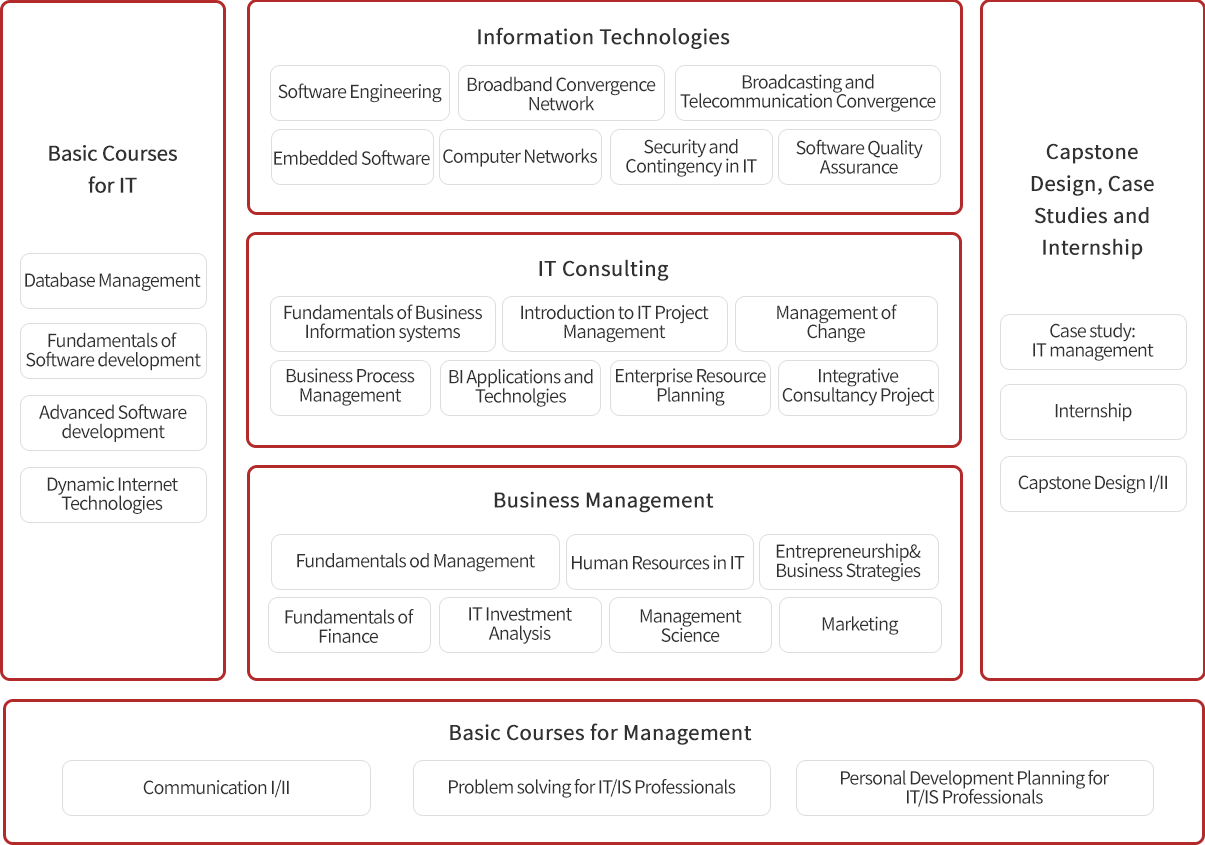[Database Practice Web programming]
In this module, students will conduct laboratory works and application development with database design and implementation, and build essential parts for an operating system. Students will improve their skills in applying what they have learned in ITM411, and extend their understanding in data and system architectures in IT systems. Students will also have an opportunity in developing web applications utilizing DBMS.
[Operating Systems Design]
The goal of this course is to provide an introduction to the internal operation of modern operating systems. In particular, the course will cover processes and threads, mutual exclusion, CPU scheduling, deadlock, memory management, and file systems.
[Computer Networks]
The module aims to provide students with an understanding of the role and internal operation of computer networks. It introduces basic concepts and technologies, with specific reference to the Internet, in order to give students an understanding of the demands placed upon computer networks, and the technology required for them to successfully support current and emerging applications.
[Fundamentals of Finance]
This module briefly covers the financial system and reviews the structure and uses of corporate financial statements. Then, three analytical “pillars” of finance- optimization over time, asset valuation, and risk management- are discussed. Its focus is on principles rather than institutional structures, although some discussion of institutions is given. The module will be delivered via a combination of lectures and directed and independent learning. Assessment consists of quizzes and a final examination. The student will receive formative feedback throughout the lectures.
[Strategic Technology Management]
Technology innovation management is a rapidly emerging area as technological innovation has been at the core of sustainable competitive advantage for firms. The module provides an overview of technological innovation management with an emphasis on the integrative relationship of technology development with strategic planning, marketing, finance, engineering and operations over the entire life cycle of technology. Through a combination of lectures, case studies, and a term-project, this module will examine not only the fundamentals of managing innovation and technological dynamics, but also the formulation and implementation innovation strategies within an organization. Assessment will be made based on case presentations, term-project outputs, and final exam.
[Data Mining]
This module aims to provide students with the theoretical and practical knowledge and skills to collect, modify, and analyse a large amount of data from various sources. Topics covered in this module include basic unsupervised/supervised learning algorithms, novelty detection algorithms, custering methods, and association rules such as k-nearest neighbour, Naïve Bayesian classifier, decision tree, and support vector machines, clustering algorithms including K-Means and hierarchical clustering, and A-priori rules. This module comprises lectures and programming exercises with Python language to develop the practical skills of data mining. The students are assessed by one quiz in the middle of the semester, the final-exam at the end of the semester, and a set of (2~4) Python programming assignments during the course.
[Software Engineering]
Software engineering is one of modules for Level 5. The objective of this module is to introduce students to the methodologies involved in the development and maintenance of software over its entire life cycle. This module includes several life cycle models, requirement dictation process, analysis modelling and specification, architectural design methods, implementation and testing strategies, verification and validation techniques, and project planning and management.
[Business Process Management]
This module introduces a process-oriented view of the flows of materials, information, products and services through and across organizational functions. All organizations must carefully analyze and document their business processes and must continuously assess the efficiency and effectiveness of these processes to minimize cost and maximize value creation.
[Mobile Programming]
This module introduces the programming technologies and design approaches for mobile computing systems. Students study relevant applications to understand them better. This module gives students a chance to construct their own application on a widely-used mobile platform.
[Management Science]
This module focuses the study of concepts relating to management science in various informations applied service & operations organizations. The management science is simply a scientific approach to decision making that seeks to best design and operate a system, usually under conditions requiring the allocation of scarce resources. Quantitative methods of analysis used to support decision making in the various operations management activities will be employed to relate theory to practice. Students can obtain broad knowledge of mathematical and probability models. And they are given several problems, which are carefully chosen to practice management science techniques.
[Enterprise Resources Planning]
Enterprise Resource Planning (ERP) software programs are at the cutting edge of information systems technology. ERP systems help to manage company-wide business processes, using a common database and shared management reporting tools. Student will learn how ERP systems support the efficient operation of business processes by integrating business activities, including sales, marketing, manufacturing, accounting, and staffing. The module will be delivered via a combination of lectures and directed and independent learning. Assessment consists of quizzes and a final examination. The student will receive formative feedback throughout the lectures.
[Business Analytics]
This module aims to provide students with technologies, applications, practices, and skills for continuous iterative exploration and investigation of past business performance along with external data generated from diverse sources such as web and social network service (SNS) to gain insights and drive business planning. Topics covered in this module include statistical and quantitative analysis, explanatory and predictive modelling. While several data mining algorithms including basic unsupervised/supervised learning algorithms are especially empathized in ITM 516 Data Mining module, this module covers the whole process of data mining consisting of data collection, prepressing, modelling and analysis. This module comprises lectures and programming exercises to implement business analytics techniques. The students are assessed by mid-term exam in the middle of the semester, the final-exam at the end of the semester, and a set of (2~4) programming assignments during the course and the term project.






